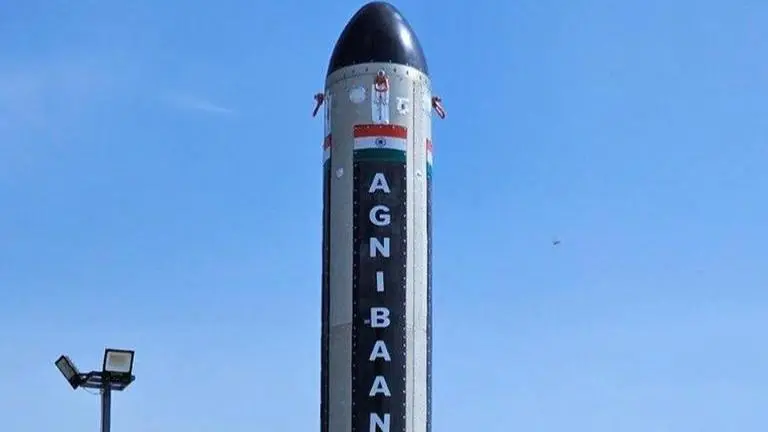Updated 17 August 2023 at 20:05 IST
AgniKul Cosmos showcases its Agnibaan rocket at India's first private launch pad
AgniKul Cosmos shared pictures of its single-stage Agnibaan rocket which underwent integration checks at ISRO's Satish Dhawan Space Center.
- Science News
- 2 min read

Chennai-based aerospace firm AgniKul Cosmos shared pictures of its Agnibaan rocket which is preparing for an orbital launch from India's first private launch pad. The company is currently working on the single-stage Agnibaan SOrTeD (Suborbital Tech Demonstrator) which underwent integration checks at ISRO's Satish Dhawan Space Center in Sriharikota.
"The trajectory, manoeuvres & various flight events that will occur during the mission have been configured to validate tech integral to the success of our upcoming orbital flights," Agnikul posted on X.
Humbled to have had the opportunity to bring our Agnibaan SOrTeD vehicle to our Launchpad at SDSC-SHAR on Independence Day to commence integration checks. We thank @isro and @INSPACeIND for their continuous encouragement and support in getting us this far. (1/n) pic.twitter.com/LvcTgxP5XT
— AgniKul Cosmos (@AgnikulCosmos) August 17, 2023
According to Agnikul, the Agnibaan rocket is powered by an Agnilet engine which is entirely 3D printed, runs on cryogenic fuel (liquid oxygen) and is capable of generating 6 kN of thrust at sea level. When the rocket launches, AgniKul will become the second private company in India to launch its own rocket after Skyroot Aerospace's Vikram-S lifted off from Sriharikota on November 18.
Introducing the Agnibaan launch vehicle
The Agnibaan rocket is a customisable launch vehicle that could be launched in one or two stages. It is capable of carrying payloads up to 100 kg to an altitude of 700 km in five different configurations. The company says that the rocket's first stage could have up to seven Agnilet engines, depending on the mission, which are powered by Liquid Oxygen and Kerosene. The launch vehicle can also customised to include a 'baby stage' for select missions.
Advertisement
[Agnibaan SOrTeD at the AgnuKul's launch pad in Sriharikota; (Image: X/@AgniKul Cosmos]
Interestingly, the quick turnaround time could be the biggest advantage AgniKul can have over its competitors as it claims that payload integration to launch could happen in just two weeks. Besides, the rocket is also designed for launch from more than 10 different launch ports.
Advertisement
The rocket stands 18 metres tall and has a mass of 14,000 kg. To ensure its compatibility with multiple launch ports, AgniKul has built a launch pedestal named 'Dhanush' that will support the rocket's mobility across all its configurations. "Dhanush was built and conceived as a separate product that enables the process of launching to be reliable and repeatable with consistency," the description on AgniKul's website says.
Published By : Harsh Vardhan
Published On: 17 August 2023 at 19:14 IST

